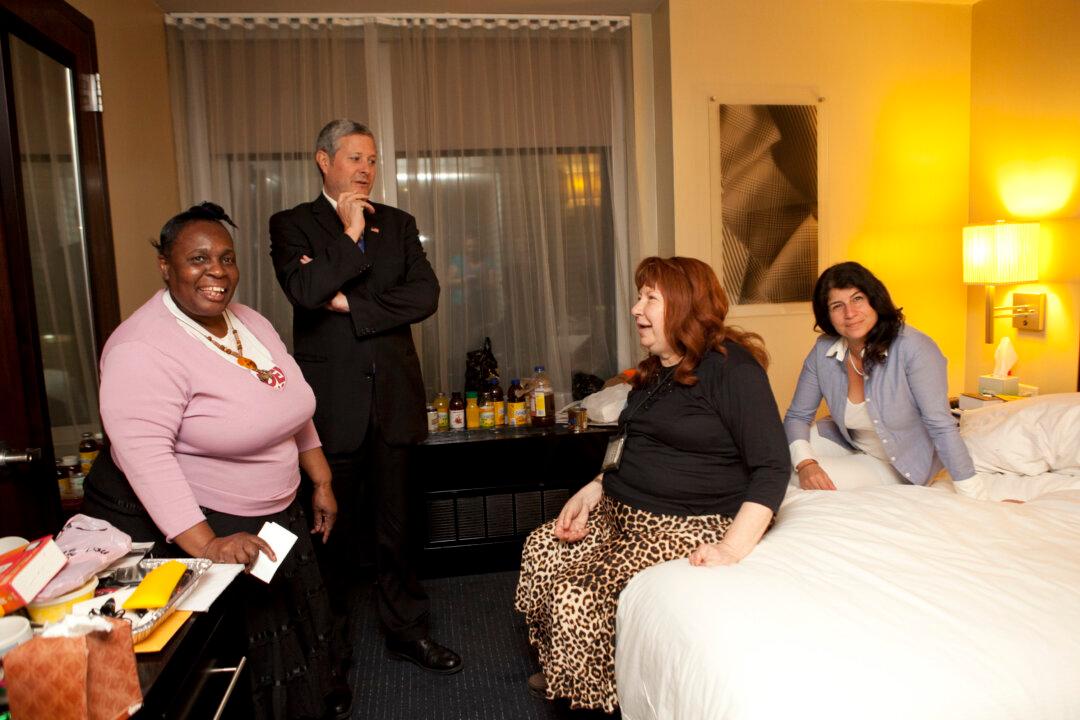NEW YORK—Many Sandy evacuees still living in city-sponsored hotel rooms were rescued from imminent homelessness on Oct. 4 by an unexpected $1 million donation from the American Red Cross. The money was initially thought to come from an “anonymous donor.”
Up against a deadline to leave their hotels last Friday, most of the 300 hurricane victims faced the very real prospect of moving to homeless shelters. Then the phone calls started coming in to evacuees on Thursday: an anonymous donor had paid for their hotel rooms for at least two more weeks.
“I wonder if it was [Mayor] Bloomberg,” mused Rachal Azani, who has been staying at a Holiday Inn in Brooklyn. “I’m extremely relieved. I wish they would say who it was!”
Azani was with a group of three other evacuees in the lobby of the Hilton Hotel at 26th Street and 7th Avenue in Manhattan when they heard the news. Ten months of living without a permanent home and facing constant uncertainty has taken its toll on them in different ways, and Thursday they reflected on their sudden turn of fate.
“There are good people in the world, and I feel very grateful,” said Joan Sweet, who has been living at the Hilton for two months. Before that, she spent eight months at a YMCA.
The $1 million Red Cross donation came from a $307 million fund donated by the American public after Hurricane Sandy.
According to Josh Lockwood, regional CEO for the American Red Cross Greater New York Region, the money will go toward supporting expenses for evacuees to remain in hotels until they have secured housing. Only those who have some kind of housing option lined up and are waiting to finalize details are eligible to stay in the hotels longer than two weeks under the new funding.
Lockwood said they hadn’t intentionally kept the source of the donation anonymous, they were just busy.
“We were focused on providing support; we are still really focused,” said Lockwood.
He added that of the $307 million from the Sandy relief fund, $272 million has already been spent. The Red Cross wanted to support the group of evacuees in hotels to get into permanent homes, he said.
“This is funding from the American public who’ve expressed their empathy [for Sandy survivors],” said Lockwood.
Transitioning
The city has been recommending that those evacuees with no place to live transition to homeless shelters, according to a New York Dept. of Homeless Services spokesperson. Most of the evacuees are within days or weeks of securing a permanent home.
The New York Disaster Interfaith Services (NYDIS), which facilitated the donation and is administering the services supported by the donation, and Legal Aid, are trying to connect with evacuees who may still not know the news. Peter Gudaitis, chief response officer with NYDIS, said many of them moved out before hearing about the extension.
Most eligible evacuees still in the hotels won’t need more than two to six weeks to secure housing, according to NYDIS. The organization serves as a gatekeeper for funds from the faith-based community, and provides disaster readiness, response, and recovery services to New York City.
UPDATE:
On Saturday afternoon, there were still 94 households living in 107 hotel rooms, according to NYDIS. Each household consists of about one to ten people, and could occupy more than one room. According to New York City’s law department, the average cost per hotel room was $265 per night.
By NYDIS’s calculation, it will cost $175,000 a week to house the evacuees. That is after many of the hotels offered significantly reduced rates.
Joshua Goldfein, an attorney with the Legal Aid Society, said most evacuees are close to having a stable situation, but are not quite there yet.
“We have a large number of people who have some kind of plan,” said Goldfein.
The city-sponsored hotel program has cost about $73 million over 10 months and officially ended on Oct. 4. Legal Aid said the city will still provide caseworker services for one month.
Spread across all five boroughs, those facing the deadline were the last group out of the approximately 3,000 Sandy victims that went through the city-sponsored hotel program.




